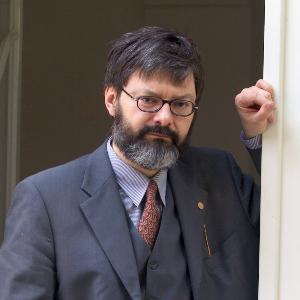Prof. Dr. Heinrich Meier
Honorary Professor
Office address:
Carl Friedrich von Siemens Stiftung, Südliches Schloßrondell 23
80638 München
+49 89 8204126
Office hours:
By appointment

Honorary Professor
Office address:
Carl Friedrich von Siemens Stiftung, Südliches Schloßrondell 23
80638 München
+49 89 8204126
Office hours:
By appointment

Political philosophy, history of philosophy, especially Lukrez, Machiavelli, Rousseau, Nietzsche, Heidegger and Leo Strauss.
Advanced Seminar
Heidegger and the Gods (I): Philosophy and Theology
Three-hour seminar
Mondays, 10:00 a.m. (c.t.) – 1:15 p.m.
Room M 209 (LMU Main Building)
Start: October 13, 2025
P, R, GdP-N II
This seminar marks the beginning of a trilogy—(II) Philosophy and Poetry, (III) Philosophy and Politics—that engages with Heidegger’s thought, continuously reflecting on the question of what significance he attributes to the gods and the divine after the "death of God." Topics include Heidegger’s early encounter with Christian theology, his expectation of the "last god as a beginning," the concept of the "fourfold" (earth and sky, mortals and divinities), and his famous statement: "Only a god can still save us." The central focus will be Heidegger’s invocation of Hölderlin’s poetry, culminating in an exploration of the implications for philosophy and politics.
This first seminar will concentrate on the following texts:
Requirements for ECTS credits:
To earn ECTS credits, participants must submit a written paper, which requires familiarity with the seminar’s interpretations, as they are developed in discussion and cannot be solely derived from the literature. Attendance at all seminar sessions is therefore mandatory.
Recommended Readings:
WiSe 2000/2001 - Rousseaus Politische Philosophie I
SoSe 2001 Rousseaus Politische Philosophie II
WiSe 2001/2002 Friedrich Nietzsche: Jenseits von Gut und Böse
SoSe 2002 Das theologisch-politische Problem
WiSe 2002/2003 Rousseau über das philosophische Leben I - Rousseau juge de Jean-Jacques
SoSe 2003 Rousseau über das philosophische Leben II - Les rêveries du Promeneur Solitaire
WiSe 2003/2004 Die Religionskritik Rousseaus
SoSe 2004 Die Politik der Philosophen: Leo Strauss und Alexandre Kojève über Tyrannis
WiSe 2004/2005 Ecce Homo: Nietzsche über das philosophische Leben
SoSe 2005 Friedrich Nietzsche: Götzendämmerung und Der Fall Wagner
WiSe 2005/2006 „Die Umwertung aller Werte“: Nietzsches Aufgabe in Der Antichrist
SoSe 2006 Das Recht der Politik und die Erkenntnis des Philosophen: Rousseaus „Gesellschaftsvertrag“
WiSe 2006/2007 Politik und Religion: Rousseaus Lettres écrites de la montagne
SoSe 2007 Rousseau über das wohlgeordnete Gemeinwesen: Die Verfassungsentwürfe für Korsika und Polen
WiSe 2007/2008 Friedrich Nietzsche: Vom Nutzen und Nachteil der Historie für das Leben und Über Wahrheit und Lüge im aussermoralischen Sinne
SoSe 2008 Friedrich Nietzsche: Die fröhliche Wissenschaft
SoSe 2009 Rousseaus Auseinandersetzung mit dem Christentum
SoSe 2010 Politik und Religion: Leo Strauss über Niccolò Machiavelli
WiSe 2010/11 Was ist Politische Philosophie? Leo Strauss und die Erneuerung der Politischen Philosophie
SoSe 2011 Philosophie als Lebensweise. Leo Strauss und die Erneuerung der Politischen Philosophie II
WiSe 2011/12 Friedrich Nietzsche: Morgenröthe
SoSe 2012 Nietzsche über den Philosophen und die Moral nach dem "Tode Gottes"
WiSe 2012/13 Friedrich Nietzsche: Der Antichrist — Die Bestimmung des Philosophen
SoSe 2013 Friedrich Nietzsche: Zur Genealogie der Moral
WiSe 2013/14 Friedrich Nietzsche: Also sprach Zarathustra. I und II
SoSe 2014 Friedrich Nietzsche: Also sprach Zarathustra. III und IV
WiSe 2014/15 Friedrich Nietzsche: Jenseits von Gut und Böse
SoSe 2015 Friedrich Nietzsche: Götzen-Dämmerung
WiSe 2015/16 Friedrich Nietzsche: Ecce homo — Der Schlußstein des Œuvre
WiSe 2016/17 Nietzsches Kampf mit Sokrates: Die Geburt der Tragödie
WiSe 2017/18 Leo Strauss: Naturrecht und Geschichte
WiSe 2018/19 Jerusalem und Athen: Der Streit zwischen Offenbarungsglaube und Philosophie
WiSe 2019/20 Philosophie und Dichtung: Leo Strauss und Lukrez: Über die Natur der Dinge
WiSe 2021/22 Philosophie und Komödie: Leo Strauss’ „Socrates and Aristophanes”
WiSe 2022/23 Politik und Philosophie: Leo Strauss’ „The City and Man"
WiSe 2023/24 Leo Strauss' philosophische "Autobiographie"
WiSe 2024/2025 Friedrich Nietzsche Die fröhliche Wissenschaft